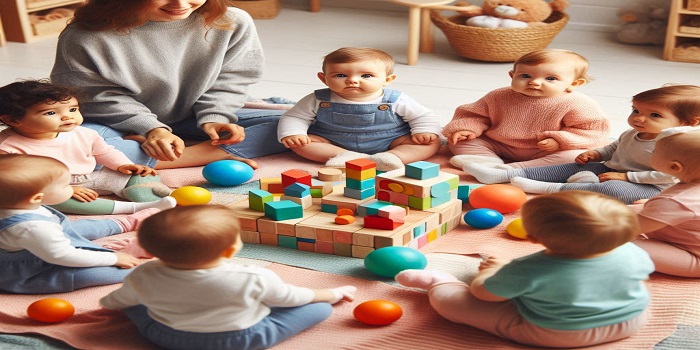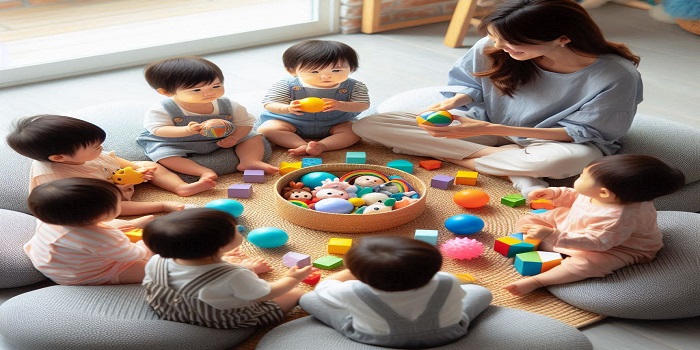Montessori Activities for Babies
Montessori activities babies are educational tasks and exercises designed to support the developmental principles of the Montessori method, an approach to early childhood education founded by Dr. Maria Montessori. These activities are crafted to promote learning through exploration, hands-on experience, and self-directed activity. Allowing children to engage with their environment in a meaningful way. Here’s a closer look at what Montessori activities are and how they work:
Key Principles of Montessori Activities Babies
- Child-Centered Learning: Montessori activities are designed to meet the individual needs and interests of each child. The idea is to provide an environment where children can choose activities that engage them, fostering intrinsic motivation and a love of learning.
- Hands-On Learning: Montessori activities often involve tangible materials that children can manipulate, explore, and interact with. This hands-on approach helps children learn through direct experience rather than passive observation.
- Freedom with Responsibility: Children are given the freedom to explore and choose their activities within a structured environment. This freedom is balanced with a sense of responsibility and respect for the materials and space.
- Self-Paced Learning: Activities are designed to be self-correcting. Allowing children to learn from their mistakes and make improvements independently. This approach helps build problem-solving skills and encourages self-directed learning.
- Prepared Environment: The Montessori environment is carefully prepared to include materials and activities. That are age-appropriate and designed to support specific developmental goals. The space is organized and accessible, allowing children to move freely and engage with the materials.

Types of Montessori Activities for Babies
- Sensorial Activities: These activities focus on refining the senses (sight, sound, touch, taste, and smell). Examples include texture boards, color-matching exercises, and sound cylinders. They help children develop sensory perception and discrimination.
- Practical Life Activities: These activities mimic everyday tasks and skills, such as pouring, sweeping, and buttoning. Practical life activities help children develop fine motor skills, coordination, and a sense of responsibility.
- Cultural Activities: These activities introduce children to different cultures, geography, and history. Examples include maps, cultural artifacts, and activities related to various traditions and customs.
- Language Activities: Montessori language activities support early literacy and communication skills. These might include letter tracing, matching objects with their names, and storytelling. They help develop vocabulary, reading, and writing skills.
- Mathematics Activities: Montessori math materials are designed to make abstract concepts concrete. Examples include counting beads, number rods, and shape-sorting activities. These materials help children understand mathematical concepts through hands-on experience.
- Science Activities: Science activities in Montessori education encourage exploration and inquiry. They might involve experiments, observing nature, and learning about plants and animals. These activities foster curiosity and scientific thinking.

Benefits of Montessori Activities for Babies
- Enhanced Independence: Montessori activities encourage children to work independently and take initiative in their learning.
- Improved Concentration: Children often show increased focus and attention when engaged in Montessori activities due to their self-directed nature.
- Development of Fine and Gross Motor Skills: Activities are designed to support the development of both fine and gross motor skills through purposeful movement and manipulation.
- Fostering Critical Thinking: Hands-on and self-correcting materials promote problem-solving and critical thinking skills.
- Encouragement of Social Skills: Many Montessori activities are designed for group work. Helping children develop collaboration and communication skills.
Download free Montessori Activities for Babies in PDF Format
FAQ Section
- What age is appropriate for starting Montessori activities?
- Montessori activities can be adapted for different ages, starting from infancy. Activities should match the baby’s developmental stage.
- How can I create a Montessori-friendly environment at home?
- Design a safe and organized space with accessible materials and encourage independent exploration.
- Are Montessori activities suitable for all babies?
- Yes, Montessori activities are flexible and can be tailored to suit the needs and interests of each baby.
- How often should I introduce new activities?
- Introduce new activities gradually, observing the baby’s interest and readiness without overwhelming them.
- Can I use Montessori activities if my baby has special needs?
- Montessori principles can be adapted to accommodate special needs. Modify activities as required and consult with professionals for guidance.
- How can I encourage my baby to engage with Montessori activities?
- Ensure activities are engaging and accessible. Follow the baby’s lead and encourage them without pressuring them.
- Are there any safety concerns I should be aware of with Montessori activities?
- Always use age-appropriate, safe materials. Supervise the baby during activities to prevent accidents and regularly check for hazards.

Summary
Montessori activities for babies are integral to the Montessori method, providing a rich and supportive framework for children’s learning and development. By focusing on the needs and interests of each child, these activities aim to nurture a lifelong love of learning and a deep understanding of the world.
